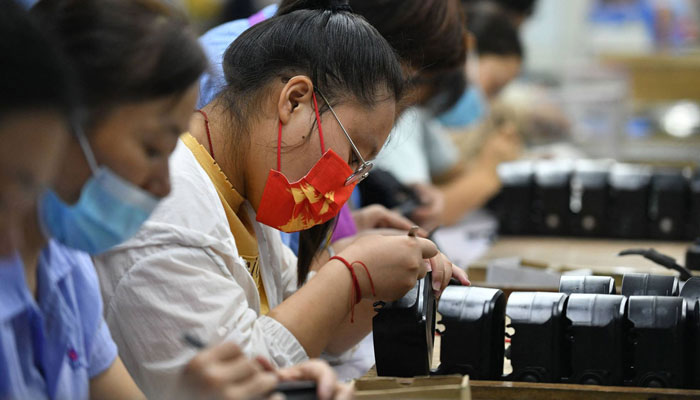Chinese experts share economic growth secrets
KARACHI: The Pakistan Institute of Development Economics (PIDE) hosted a high-level Chinese delegation on Friday to discuss strategies for boosting Pakistan’s economy.
The event, titled ‘Pakistan Economy & Growth: Learning from Chinese Experience’, aimed to share insights on China’s economic success story.
PIDE Vice Chancellor Dr Nadeemul Haque emphasized Pakistan’s potential for rapid growth, citing its young population and expanding middle class. He highlighted the importance of the China-Pakistan Economic Corridor (CPEC) in driving economic development and regional connectivity.
A Chinese delegation of experts from various fields shared their country’s experience in infrastructure development, technology, education, and governance. They stressed the importance of effective policies, institutional reforms, and investment in human capital for achieving sustained economic growth.
Dr Haque added that Pakistan’s demographic profile, with a median age of just 20.6 years and a labour force expanding by over three million annually, is a cornerstone of its growth potential. He noted that the projected growth rate of 7-8 per cent per annum is within reach with strategic reforms, positioning Pakistan as a future market leader. By 2030, Pakistan is expected to become the seventh largest consumer market globally, underscoring its vast potential.
He pointed out that Pakistan is undergoing significant reforms to create a more investment-friendly environment. Moving from a permission-based to a rule-based economy, the government is addressing regulatory challenges that have historically hampered growth. The implementation of Regulatory Impact Assessments (RIAs) and the reduction of excessive permissions are crucial steps towards this transformation.
He highlighted that Pakistan’s burgeoning market for electric vehicles (EVs) represents a significant growth area. With over 50 per cent of households owning motorbikes and a growing demand for cars, the market for 2- and 4-wheel EVs is set to expand rapidly.
Initiatives to promote EVs and public transport in Islamabad are already underway, positioning Pakistan strategically as a hub for EV production for both local and export markets.In her introductory remarks, PIDE’s Pro VC Dr Durre Nayab emphasized the importance of such interactions in fostering growth and development. She highlighted the need for adopting strategies that have propelled China to economic success, tailored to Pakistan’s unique context.
In this context, a Chinese delegation comprising experts from diverse fields will be visiting Pakistan. These experts bring a wealth of knowledge and experience from their respective domains, aiming to foster deeper collaboration and mutual growth. Their insights and recommendations are expected to play a crucial role in shaping the next phase of Pakistan’s development under the CPEC framework.
Chinese lead experts lauded PIDE for its exceptional efforts in identifying and addressing the critical challenges facing Pakistan. Effective governance and institutional reforms, including streamlined bureaucracy and anti-corruption measures, were critical to China's development. Pakistan can adopt these reforms to improve governance, strengthen institutions, and enhance transparency. Emulating China's policies, infrastructure investments, SEZs, human capital development, technological innovation, export promotion, and governance reforms can pave the way for Pakistan's prosperity.
Participants from Pakistani think tanks emphasized the need for skill development, industrial linkages, and technology transfer with China. The event concluded with both sides expressing commitment to further collaboration and knowledge sharing.
-
 Patriots' WAGs Slam Cardi B Amid Plans For Super Bowl Party: She Is 'attention-seeker'
Patriots' WAGs Slam Cardi B Amid Plans For Super Bowl Party: She Is 'attention-seeker' -
 Martha Stewart On Surviving Rigorous Times Amid Upcoming Memoir Release
Martha Stewart On Surviving Rigorous Times Amid Upcoming Memoir Release -
 Prince Harry Seen As Crucial To Monarchy’s Future Amid Andrew, Fergie Scandal
Prince Harry Seen As Crucial To Monarchy’s Future Amid Andrew, Fergie Scandal -
 Chris Robinson Spills The Beans On His, Kate Hudson's Son's Career Ambitions
Chris Robinson Spills The Beans On His, Kate Hudson's Son's Career Ambitions -
 18-month Old On Life-saving Medication Returned To ICE Detention
18-month Old On Life-saving Medication Returned To ICE Detention -
 Major Hollywood Stars Descend On 2026 Super Bowl's Exclusive Party
Major Hollywood Stars Descend On 2026 Super Bowl's Exclusive Party -
 Cardi B Says THIS About Bad Bunny's Grammy Statement
Cardi B Says THIS About Bad Bunny's Grammy Statement -
 Sarah Ferguson's Silence A 'weakness Or Strategy'
Sarah Ferguson's Silence A 'weakness Or Strategy' -
 Garrett Morris Raves About His '2 Broke Girls' Co-star Jennifer Coolidge
Garrett Morris Raves About His '2 Broke Girls' Co-star Jennifer Coolidge -
 Winter Olympics 2026: When & Where To Watch The Iconic Ice Dance ?
Winter Olympics 2026: When & Where To Watch The Iconic Ice Dance ? -
 Melissa Joan Hart Reflects On Social Challenges As A Child Actor
Melissa Joan Hart Reflects On Social Challenges As A Child Actor -
 'Gossip Girl' Star Reveals Why She'll Never Return To Acting
'Gossip Girl' Star Reveals Why She'll Never Return To Acting -
 Chicago Child, 8, Dead After 'months Of Abuse, Starvation', Two Arrested
Chicago Child, 8, Dead After 'months Of Abuse, Starvation', Two Arrested -
 Travis Kelce's True Feelings About Taylor Swift's Pal Ryan Reynolds Revealed
Travis Kelce's True Feelings About Taylor Swift's Pal Ryan Reynolds Revealed -
 Michael Keaton Recalls Working With Catherine O'Hara In 'Beetlejuice'
Michael Keaton Recalls Working With Catherine O'Hara In 'Beetlejuice' -
 King Charles, Princess Anne, Prince Edward Still Shield Andrew From Police
King Charles, Princess Anne, Prince Edward Still Shield Andrew From Police




